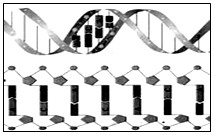题目内容
B. however
C. whichever
D. whenever

| |||||||||||||||||||||||||||||||||||||||||||||||||||||||||||||||||||||||||
People cannot reach an agreement on the use of science and technology. For example, will radiation from electronic equipment destroy the environment? Should medical scientists change gene structures to prevent genetic disease or to create “more perfect” human beings? While people are arguing about these and others, technology continues to influence our everyday lives—the home, health and education, entertainment and communication, and so on.
Some people carry on active social lives with computers —their own or the ones in public places like cafes, social centers, libraries, and so on. Communicating with others in chat rooms, computer users can get to know people they might never meet in traditional ways. With live online video connections, two people with cameras in their computers can see and talk to each other from separate places.
With modern telephone technology, most people stopped writing lettters—especially personal letters and notes. But now, writing to communicate has returned in electronic form, or e-mail, which is a way of sending messages from one computer to another. For some computer users, the wish to communicate intelligently or creatively with others makes them want to write better.
Computer technology has also made it possible to run a house electronically. From turning lights on and off to starting the coffee and cooking the hot meal, computers are taking care of people at home. Many modern machines have computer chips that allow their owners to program them. For instance, you can “instruct” a microwave oven how to cook a dish. Most entertainment equipment operates with computer technology too. Computers can even start cars automatically so that on cold winter mornings you can get into a warmed-up vehicle and drive off.
Although much of the technology in our everyday lives has good effects, there are some uses that raise questions. For example, are interactive media ( i.e., a combination of television, telephone, and computer) going to control minds, cause people to forget about family life and personal relationships? What effects will the genentic engineering of food have on people’s health? High-tech medical treatments can make a person live a much longer life, but can they improve the health and happiness of human beings? Only time will tell, but, in the meantime, science and technology will continue to move forward.
【小题1】 What does the underlined word “ chips” mean?
| A.thin pieces of potatoes | B.small holes | C.small pieces of wood | D.central parts |
| A.technology never stops changing our everyday lives |
| B.with computers each of us can live a comfortable life |
| C.people can do more activities with computers |
| D.the more you use computers, the better you might write |
| A.The longer you live, the happier you are. |
| B.High-tech medical treatments can’t improve our health and happiness. |
| C.High-tech medical treatments can’t help us with everything. |
| D.The writer questioned high-tech medical treatments somehow. |
| A.Science and New Technology | B.Computers Change Our Lives |
| C.Everyday Uses of Technology | D.Only Time Will Tell |



 cause good or bad resutls.
cause good or bad resutls.